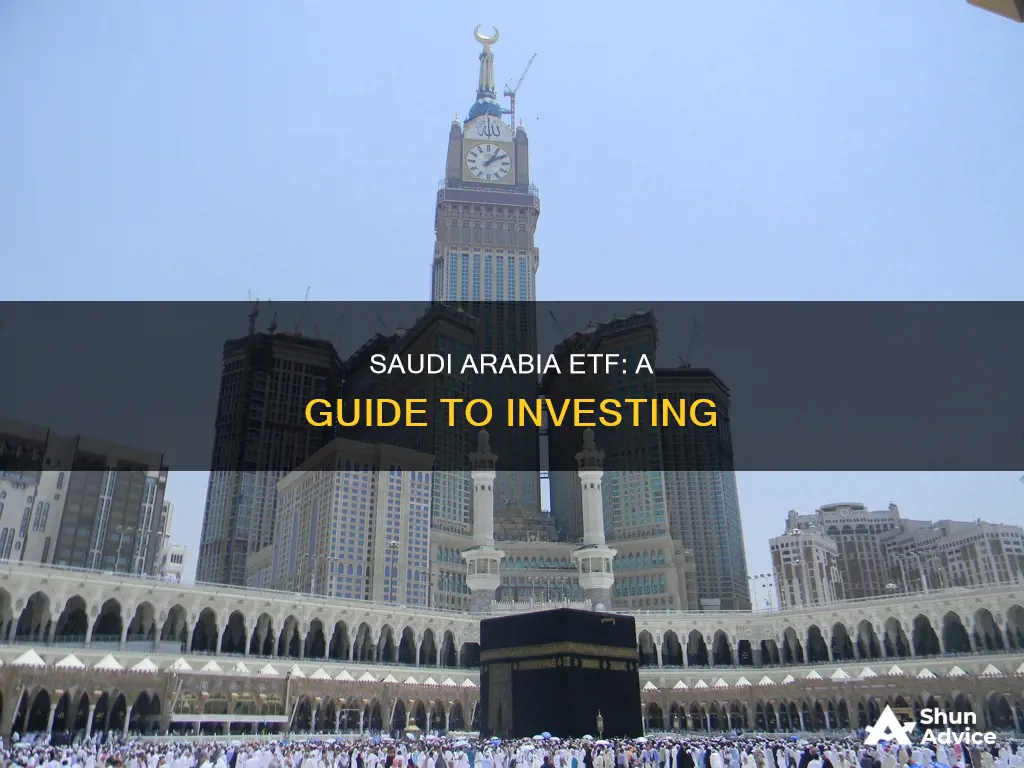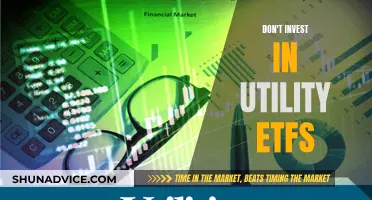
Saudi Arabia's stock exchange, known as the Tadawul, is a marketplace that has traditionally been closed to foreign investors. However, in recent years, the country has been working towards diversifying its economy and encouraging private enterprises beyond oil. This has opened up new investment opportunities, particularly for those interested in exchange-traded funds (ETFs). ETFs are one of the investment options available on the Saudi Exchange, and they offer exposure to a range of Saudi Arabian equities. While direct investment in Saudi stocks is limited to financial institutions and billionaires, ETFs provide an alternative way for investors to gain access to the country's market. Examples of ETFs with Saudi Arabia exposure include the iShares MSCI Saudi Arabia ETF, the Franklin FTSE Saudi Arabia Fund, and the SPDR S&P Emerging Middle East and Africa ETF (GAF). By investing in these ETFs, individuals can gain exposure to the Saudi Arabian stock market and benefit from the country's growth potential.
What You'll Learn

Accessing the Saudi Arabian stock market
The Saudi Arabian stock market, or the Saudi Stock Exchange (Tadawul), has historically been closed to foreign investors. However, in recent years, the country has made efforts to open up its market and attract foreign investment. Here are some ways to access and invest in the Saudi Arabian stock market:
Exchange-Traded Funds (ETFs)
One way to gain exposure to the Saudi Arabian stock market is through Exchange-Traded Funds (ETFs). ETFs are baskets of securities that trade on an exchange like a stock. They offer investors a simple and cost-effective way to diversify their portfolios and invest in a particular market or sector. Here are some ETFs that provide exposure to Saudi Arabian stocks:
- IShares MSCI Saudi Arabia ETF
- Franklin FTSE Saudi Arabia Fund
- SPDR S&P Emerging Middle East and Africa ETF (GAF)
- WisdomTree Middle East Dividend Fund (GULF)
Direct Investment in Saudi Stocks
For those looking to invest directly in Saudi stocks, there are a few options available, but it is important to note that regulations and restrictions limit foreign investment in Saudi stocks. Here are some key points to consider:
- The Tadawul permits only established institutional foreign investors, not individual investors, to trade.
- A qualified foreign investor is typically defined as an entity with at least $5 billion in assets under management and has been in business for at least five years.
- Foreign investors may own no more than 5% of the shares issued in any one company.
- All foreign investors collectively may own no more than 49% of any company's shares.
- Qualified foreign investors are limited to 20% of a single company's shares and 10% of all the shares of the companies listed on the exchange.
- Foreigners who want to invest in Saudi stocks typically work through global institutions that operate in the country, such as Morgan Stanley and Credit Suisse Group.
Mutual Funds and Investment Funds
Another way to gain exposure to the Saudi Arabian market is through mutual funds or investment funds that focus on the region. These funds pool money from multiple investors and invest in a variety of Saudi Arabian companies or projects. This option provides diversification and is managed by professional fund managers.
Saudi Arabian Companies Listed on Foreign Exchanges
Some Saudi Arabian companies are listed on foreign stock exchanges, allowing international investors to purchase their shares without needing to invest directly on the Tadawul. For example, Saudi Aramco, the state oil company, is listed on multiple international exchanges.
Specialised Investment Platforms
There are specialised investment platforms that provide access to Saudi Arabian stocks and other financial products. These platforms often cater to international investors and may offer additional tools and resources for navigating the Saudi Arabian market.
Important Considerations
When considering investing in the Saudi Arabian stock market, it is important to keep the following in mind:
- The Saudi economy has historically been heavily reliant on oil, but efforts are being made to diversify, including encouraging private enterprises in other sectors and investing in solar energy.
- The regulations and restrictions on foreign investment in Saudi Arabia may change, so it is important to stay informed about any updates that could impact your investment strategies.
- The political and economic stability of the country should also be considered, as these factors can significantly impact the stock market and the overall investment climate.
In conclusion, while the Saudi Arabian stock market has been traditionally closed to foreign investors, there are now several options available for those looking to access this market. It is important for investors to carefully consider their investment objectives, conduct thorough research, and understand the risks and regulations associated with investing in Saudi Arabia before making any investment decisions.
Questrade ETF Investing: A Comprehensive Guide
You may want to see also

Targeted exposure to the country's growth potential
Saudi Arabia's economy is currently undergoing a transformation, implementing reforms to reduce oil dependence, diversify income sources, and enhance competitiveness. This year marks the midpoint of Saudi Arabia's ambitious Vision 2030 journey.
The iShares MSCI Saudi Arabia ETF provides targeted exposure to a country with growth potential. The ETF seeks to track the investment results of a broad-based index composed of Saudi Arabian equities.
- Access to the Saudi Arabian stock market: Historically, the Saudi Arabian stock market has been closed to foreign investors. The ETF provides a unique opportunity for international investors to access this market and gain exposure to Saudi equities.
- Growth potential: Saudi Arabia's economy is diversifying and reducing its dependence on oil. This transformation is driven by improvements in the regulatory and business environment, making it an attractive investment destination.
- Strong domestic demand: The country's non-oil growth has been spurred by strong domestic demand, particularly in private non-oil investment. This performance is expected to continue, making Saudi Arabia an attractive investment prospect.
- Reform momentum: Sustaining the country's economic growth requires maintaining the reform momentum and sound macroeconomic policies. Saudi Arabia's Vision 2030 outlines ambitious goals, and the country has been making progress in implementing these reforms.
- Diversification benefits: The diversification of Saudi Arabia's economy away from oil provides numerous benefits, including reduced vulnerability to oil price fluctuations and the development of new industries. This enhances the country's overall economic resilience and attractiveness to investors.
- Private sector development: Efforts to streamline fees and taxes faced by businesses, particularly at the local and city levels, will further boost private sector development. Additionally, the growing role of the Public Investment Fund (PIF) is expected to stimulate private sector investment.
- Risk evaluation: Rigorous monitoring and evaluation of targeted interventions and industrial policies can help minimize risks and ensure that these policies achieve their intended benefits.
By investing in the iShares MSCI Saudi Arabia ETF, investors can gain targeted exposure to Saudi Arabia's growth potential, benefiting from the country's economic reforms, diversification efforts, and strong domestic demand.
A Beginner's Guide to Investing in ETFs with Fidelity
You may want to see also

Understanding the ETF total return
For example, if an investor buys shares of a company and the share price increases, they may have also received dividends, which can add to the total return. This is different from simply looking at the yield or price return of an investment, which only measures the percentage increase in the investment's value.
In the case of the iShares MSCI Saudi Arabia ETF, the ETF total return may differ from the return of its benchmark due to the use of systematic fair value. The ETF total return is based on the ETF's net asset value, which uses systematic fair value to price certain foreign assets as of 4:00 p.m. Eastern Time. On the other hand, the benchmark return uses local market closing prices, which may differ from systematic fair value prices. This difference can result in a divergence between the ETF total return and the benchmark return.
Therefore, when evaluating the performance of Saudi Arabia ETFs, investors should consider the total return, which accounts for not only the change in the market price of the investment but also any additional income generated through dividends, interest, or capital gains.
ETFs for Tech: Direct Investment Strategies
You may want to see also

Exploring the Advisors' Portfolio Tool
The iShares MSCI Saudi Arabia ETF provides investors with access to the Saudi Arabian stock market, which has historically been closed to foreign investors. The ETF seeks to track the investment results of a broad-based index composed of Saudi Arabian equities.
Exploring the Advisors Portfolio Tool
The Advisors Portfolio Tool, also known as the 360° Evaluator tool, is an exclusive tool for advisors to analyse investments within a portfolio context. It allows advisors to evaluate how key attributes of the iShares MSCI Saudi Arabia ETF could factor into their decision-making. By visiting the Portfolio Tool, advisors can gain insights into the fund's characteristics and how it might fit into their clients' investment portfolios.
The tool provides a comprehensive overview of the ETF, including its investment objective, performance, distributions, fees, and portfolio characteristics. It also offers sustainability characteristics and business involvement metrics, allowing advisors to evaluate the fund's alignment with environmental, social, and governance (ESG) criteria.
Using the Advisors Portfolio Tool, advisors can assess the potential benefits and risks of investing in the iShares MSCI Saudi Arabia ETF. It enables advisors to make informed decisions on behalf of their clients, considering factors such as growth potential, country-specific exposure, and the fund's historical performance.
The tool also highlights the importance of working with registered financial professionals. It encourages investors to research and confirm the registration status of investment professionals before engaging their services. This helps protect investors from securities fraud and ensures they have certain legal protections.
Invest in Guyana's Future: ETFs and Opportunities
You may want to see also

ETF investment objectives
When considering investing in Saudi Arabia ETFs, there are several investment objectives to keep in mind. Here are some key objectives to consider:
- Access to the Saudi Arabian Stock Market: The Saudi Arabian stock market has historically been closed to foreign investors. However, through ETFs such as the iShares MSCI Saudi Arabia ETF, investors can gain exposure to Saudi Arabian equities, providing an opportunity to invest in a market that was previously inaccessible.
- Targeted Exposure to Growth Potential: Saudi Arabia, as an emerging market, offers potential for economic growth and development. Investing in Saudi Arabia ETFs allows investors to tap into this growth potential, particularly in sectors such as energy, infrastructure, and emerging market equities.
- Diversification and Risk Management: ETFs provide a diversified investment approach by offering exposure to a basket of Saudi Arabian stocks or specific sectors within the country. This diversification can help reduce the risk associated with investing in a single stock or industry.
- Single-Country Focus: Saudi Arabia ETFs allow investors to express a specific view on the Saudi Arabian market. This focused approach enables investors to capitalize on the potential opportunities within the country while managing their exposure to other markets.
- Tracking a Broad-Based Index: Some Saudi Arabia ETFs, such as the iShares MSCI Saudi Arabia ETF, aim to track the performance of a broad-based index composed of Saudi Arabian equities. This investment objective allows investors to gain diversified exposure to the overall Saudi Arabian stock market rather than individual stocks.
- Capital Appreciation and Dividend Income: Depending on the specific ETF, investors can aim for capital appreciation by investing in ETFs that track the performance of Saudi Arabian equities. Additionally, some ETFs may provide dividend income by investing in companies that pay dividends.
By understanding and aligning with these investment objectives, investors can make more informed decisions when considering investing in Saudi Arabia ETFs. It is important to carefully review the prospectus and seek financial advice to ensure that the chosen ETF aligns with your investment goals, risk tolerance, and time horizon.
A Beginner's Guide to ETF Investing
You may want to see also
Frequently asked questions
Examples include the iShares MSCI Saudi Arabia ETF, Franklin FTSE Saudi Arabia Fund, SPDR S&P Emerging Middle East and Africa ETF (GAF), and WisdomTree Middle East Dividend Fund (GULF).
Market Makers provide bid and ask quotes for ETFs close to their Indicative Net Asset Value (iNAV).
The Saudi Exchange has four types of funds available to investors: Exchange-Traded Funds (ETFs), Closed-Ended Investment Traded Funds (CEFs), Real Estate Investment Traded Funds (REITs), and Mutual Funds.
ETF units can be traded like any other security through brokers during trading hours. Units can also be created and redeemed through the Market Maker or any other authorized party.
The iShares MSCI Saudi Arabia ETF seeks to track the investment results of a broad-based index composed of Saudi Arabian equities.







